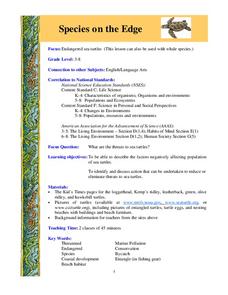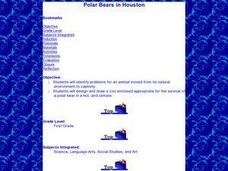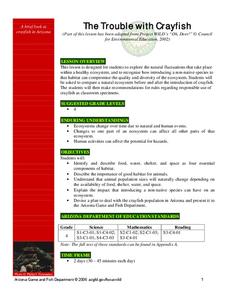Curated OER
Monsters of the Deep
Students describe major features of cold seep communities and list the organisms that are typical in these communities. In this deep sea environment lesson students work in groups and research their given cold seep group.
Curated OER
Is It Getting Hot In Here?
Students describe several factors and ways climate change could effect communities. In this climate change lesson plan students research climate change and complete a worksheet.
Curated OER
Species on the Edge
Learners examine sea turtles. In this endangered species lesson, students analyze sea turtle habitats. Learners hypothesize why sea turtles could go extinct.
Curated OER
Food Web Mystery
Young scholars describe typical marine food webs, and explain why food is generally scarce in the deep-ocean environment. They discuss reasons that seamounts may support a higher density of biological organisms than would appear to be...
Curated OER
Organisms and Their Environment
Learners explore Earth's biosphere. In this biosphere instructional activity, students participate in group activities regarding biotic and abiotic factors, population density, and species' habitats.
Curated OER
Make it a habitat
Students consider the adaptation of life forms through natural selection to fill various niches and accommodate changing environmental conditions. They select an ecosystem and conduct research to provide as much detailed information as...
Curated OER
I See a Coyote
Students role-play coyotes looking for natural resources. In this natural resources lesson plan, students examine the relationship between animal life and the environment. Students play a game that demonstrates how natural...
Curated OER
Ecosystem Interactions in Refuges
Seventh graders, using national parks as models, illustrate the energy flow in ecosystems. Working in groups, they use murals, flow charts, or other visual displays to record their findings. Students represent the food chains and webs...
Curated OER
Biological Sciences
Students examine biodiversity and interrelatedness concepts. In this ecology instructional activity students go on a field trip and fill out a data sheet.
Curated OER
Galapagos Adaptations
Students examine photographs of closely related species found in the Gal??pagos environment, observe differences and similarities between species, and form hypotheses about species differences and the relationship to the environment of...
Curated OER
Basic Needs of Plants
Fourth graders explore the four basic needs of plants. They examine plants as they grow. Students discuss the changes that they see in the growing plants. They observe what happens to a plant when one of its basic needs is taken away.
Curated OER
Polar Bears in Houston
First graders read a book about animal babies from the Arctic and discuss what a polar bear needs to survive. They design a suitable zoo habitat for a polar bear using crayons and paper.
Curated OER
My Habitat Address
Sixth graders draw a habitat and write about what they would need to survive in the habitat. They define the input of items such as materials, energy, and information, and what goes out of the habitat. They play a "Habitat Address" game,...
Curated OER
Let's Go to the Video Tape!
Students examine biological diversity and see how it relates to the concepts of variety and relative abundance. In this investigative lesson students view a video on biodiversity and complete an activity.
Curated OER
Easy as Pi
Students examine structural features. In this life science lesson students complete an activity and quantify the impact of various modifications.
Curated OER
Design a Reef!
Students design a functional model of a coral reef ecosystem. For this coral reef lesson, students identify the energy sources and material cycles of a coral reef. They write an essay about their niche in their own ecosystem.
University of South Carolina
Home Sweet Home
Fifth graders will research a biome (land or aquatic) and create a project (diorama, model or another idea of the student's choosing) which includes the geographic features of that biome as well as plants and animals found there and...
Curated OER
More Than a Campground
Fourth graders participate in a class disucssion on the term "habitat". The class brainstorms on what makes a national park special. In small groups, they research a a national park and create a mural depicting those factors that make...
Curated OER
The Trouble with Crayfish
Fourth graders compare an ecosystem before and after they introduce crayfish to that ecosystem. In this ecosystem lesson plan, 4th graders see what happens when you introduce a non native animal to a habitat. Students then make...
Curated OER
Mangrove Ecology and Adaptations
Learners create a plant or animal that would be well adapted to a habitat they selected. They first learn about Mangroves and their specific adaptations that help them survive in their habitat.
Curated OER
Plant Adaptations
Students identify parts of prairie plants. They sketch the plants indicating its adaptive parts and write brief descriptions of them. They present their findings to the class.
Curated OER
Animal Movements
Students discuss the behavior of different animals and how they move. They explore the ways that this helps them live and find food in their environment. They participate in a game that requires them to mimic the ways in which animals move.
Curated OER
Ring Detectives
Students describe the overall flow of the Gulf Stream, and explain how it affects biological communities in the North Atlantic Ocean.Students describe Gulf Stream rings, and explain how they are formed.Students be abl
Curated OER
Who's Your Neighbor?
Students recognize and identify some of the fauna groups found in deep-sea coral reef communities. They describe common feeding strategies used by benthic animals in deep-sea coral reef communities.Students be able

























